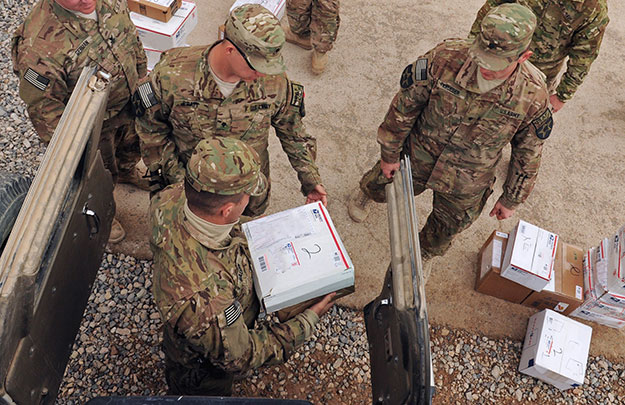(Photo: Soldiers and sailors assigned to Provincial Reconstruction Team Farah, unload care packages and Christmas gifts during mail call on FOB Farah, Dec. 15, 2019. Soldiers are reminded to abide by Department of Defense guidelines on receiving gifts during the COVID-19 stay-at-home order. Gifts distributed at the organizational level could be acceptable gifts under DoD guidelines.)
Even in difficult times, the rules still apply.
As the coronavirus continues to spread nationwide and the economy feels its impact, the Army Office of the General Counsel warns soldiers that potential problems could arise if they choose to start fundraising campaigns for themselves or other soldiers.
Some soldiers or federal employees may have spouses or family members who have lost their jobs during the nationwide lockdown. Those shouldering additional financial burdens may want to turn to popular crowd-sourced fundraising websites such as GoFundMe or Kickstarter.
 John Kent, associate deputy general counsel at the Army Office of General Counsel and expert in ethics, said soldiers should familiarize themselves with which gifts are acceptable.
John Kent, associate deputy general counsel at the Army Office of General Counsel and expert in ethics, said soldiers should familiarize themselves with which gifts are acceptable.
"A gift is OK in some instances and not OK in others," Kent said. "The overarching rule is it's not OK when the gift is either given because of the individual's status as a soldier or an Army employee, or when it comes from a prohibited source. But there are exclusions and exceptions to this rule that may apply."
Soldiers and Department of Defense employees cannot use their status as a service member or government employee as a means for soliciting funds. Further, DoD regulations generally prohibit soldiers from receiving funds from "prohibited sources" -- such as companies or private organizations that do business with or have vested interests with the DoD. Soldiers and employees also cannot receive donations from federal personnel who earn a lower annual income.
Fundraising campaigns could be organized, but rigorous accountability of donors and records of sources must be kept.
"They are theoretically possible," Kent said. "But the pragmatic problems with conducting them within the rules that we have to follow make that extremely difficult."
Soldiers who choose to run such campaigns must be able to provide records, or otherwise they may have to return the funds. Kent said the problem could be escalated further if patrons donate anonymously.
"Some platforms cannot or will not identify who the real donors are," he said. "And that poses a real problem."
As an alternative to fundraisers, soldiers can also apply for the Army Emergency Relief program to receive funds in financial emergencies. The funds can be applied towards utilities, rent and other living expenses.
As soldiers become more publically visible in the fight against the global pandemic, they should understand the rules on accepting gifts from the public. Members of the National Guard, for instance, have deployed to assist hospitals in various states throughout the country, prominently in New York City and the northeast.
Soldiers generally may not accept gifts exceeding $20 in value from a prohibited source or given to them because of their official positions as soldiers, and such gifts must not total more than $50 annually from any single source. Those gifts could include donations of protective equipment like masks and gloves. Unless an exception to the rule applies, gifts of cash may never be accepted from a prohibited source or because of one's status as a soldier.
Soldiers who have fallen ill with COVID-19 or another illness can receive certain gifts from their fellow soldiers, to include food and other comfort items subject to certain limitations. Mr. Kent recommends seeking advice from an ethics counselor before accepting or giving such gifts.
There are some exclusions and exceptions to the base rule against accepting gifts from prohibited sources or based on their official status. For example, in addition to the $20 gift rule, soldiers may accept gifts from prohibited sources if the gifts have been made available to everyone or all military members. For example, during Operation Desert Storm, Busch Gardens offered free admission to all military members and their families. Certain social gatherings that meet specific exceptions may also be acceptable. Soldiers could potentially accept financial assistance from a crowd-sourced relief fund, provided that it does not discriminate based on position, rank or pay.
Additionally, soldiers may benefit from gifts that are accepted by authorized senior Army leaders on behalf of the Army and then distributed to soldiers and Army organizations supporting soldiers. Such gifts could include equipment and discounts or free passes to entertainment events like concerts or sports games.
Soldiers should contact their ethics advisors if they are offered or have received excessive gifts from prohibited sources. Kent said such cases should be reported as early as possible.
Soldiers who have any questions regarding acceptable gifts can consult ethics counselors through their first sergeant or chain of command. Questions on whether donations from prohibited donors or fellow soldiers are acceptable should also be directed to counselors, he said. "If there is a way for a soldier to accept a gift within the applicable gift rules, the ethics counselor will try to identify how that can happen."





Read Comments